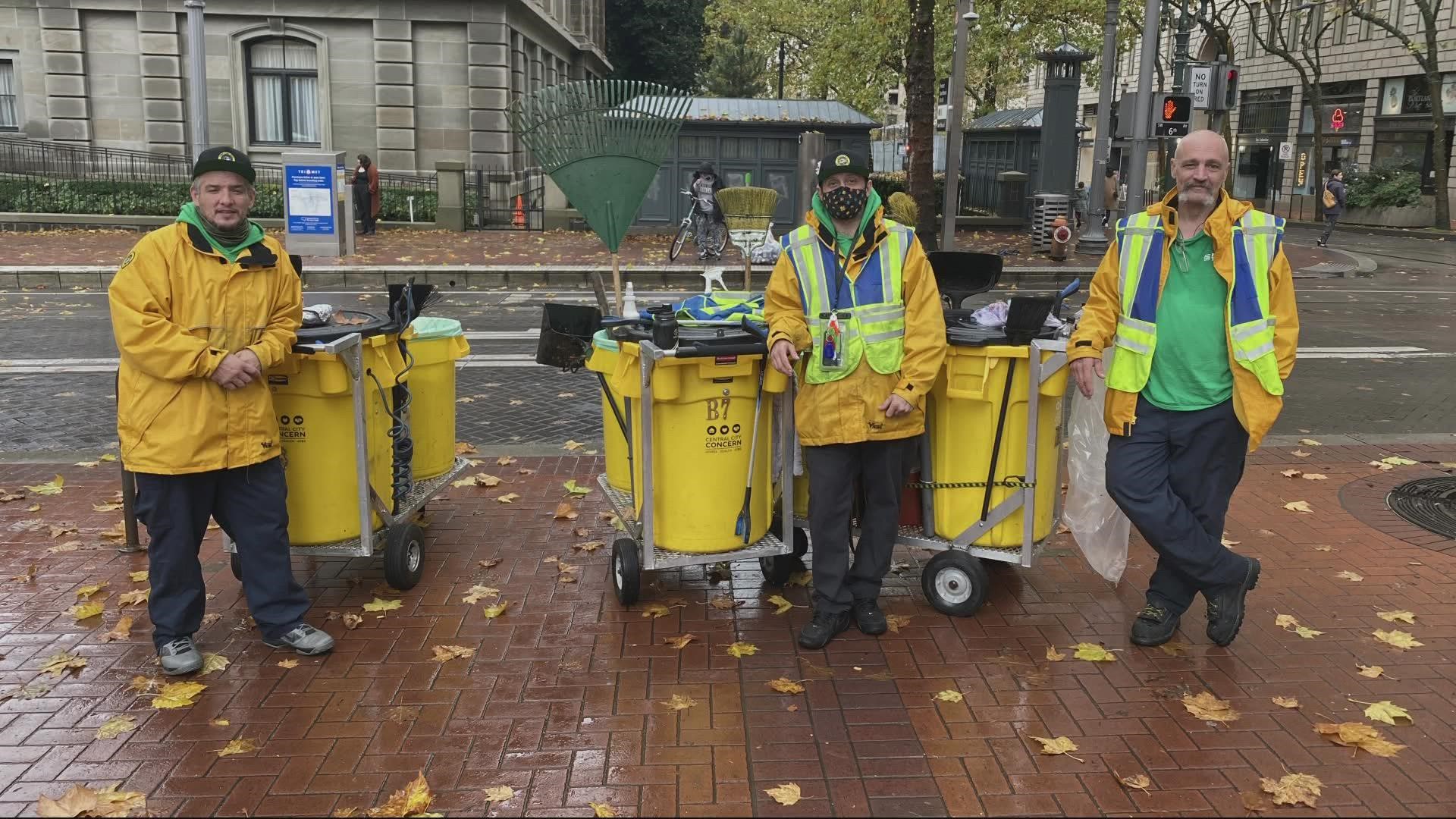PORTLAND, Ore. — On a soggy morning in downtown Portland’s Pioneer Square, three men in bright yellow coats pushed squeaky carts outfitted with trash cans down bumpy brick sidewalks. The routine is regularly triggering.
"Three weeks ago I found an 8 ball of meth on the ground," said Kenneth Morgan, a trainer with the local nonprofit Central City Concern and recovering meth addict. "I mean, it's here. We walk down the street and people shoot up."
Morgan runs a crew through Downtown Portland Clean & Safe. His staff clean up everything from graffiti to needles to feces. Most of them are recovering addicts. KGW spoke to three, all of whom say, for years, their drug of choice was meth.
"It had me hearing people talking that wasn't even talking, but I could hear them in my head, and they were all cops," said Eddie Breedwell, who’s been sober since August 2020. "I sat in the park for three hours [when I was high], afraid to move off a park bench because I thought, as soon as I get up and started walking, that they were going to get me."
Breedwell added he sees more people than ever, homeless on the streets of Portland, seemingly high on meth. Often, he said, they’re arguing with no one.
"I was in such a state of paranoia [when I was using]," he said. "If somebody came up [to me], I would have thought they were trying to get me."
Breedwell and Morgan added they’ve heard there’s a new version of meth, making a home for itself on Portland’s streets.
"We see people arguing with nobody, wanting to fight with nobody on the street right there," Breedwell said. "But that person's really there to them."
Their impressions are bolstered by a piece published in the Atlantic, that details a nationwide influx of an, until now, less common version of meth: P2P meth. Experts told the Atlantic, the method involves production with less regulated, but more lethal, chemicals, like cyanide, lye, mercury, sulfuric acid, hydrochloric acid, nitrostyrene.
The result is a more extreme high off the bat, marked by a higher degree of psychosis. Experts told The Atlantic they believe the P2P version flooded the Portland market around 2013.
"The degree of mental-health disturbance; the wave of psychosis; the profound, profound disorganization [is something] I’ve never seen before," Rachel Solotaroff, CEO of Central City Concern told the Atlantic, explaining that P2P meth was a large reason the non-profit closed their decades-old sobering station last year. "If they’re not raging and agitated, they can be completely noncommunicative. Treating addiction [relies] on your ability to have a connection with someone. But I’ve never experienced something like this—where there’s no way in to that person."
In Oregon, experts believe the shift is represented by statistics.
The Mental Health Addiction Association of Oregon says meth is now the leading cause of drug-related deaths in Portland. Across the state, overdose deaths have increased dramatically over the last 15 years.
In 2010, according to the state medical examiner, 43 people died from meth in Oregon. By 2019, that number had skyrocketed to 289.
"Folks that are getting addicted, folks that are going into or need to go into treatment folks that are suffering from meth psychosis and other behavioral health issues driven by meth addiction," said former Lincoln County District Attorney Rob Bovett. "We're seeing spikes in the state hospital. We're seeing all of these side effects play out on the street and in our systems as a result of really super potent, super pure meth everywhere."
For Morgan, Breedwell and their teammate Nick Haynard, who’s been sober from meth for six months, the struggle to stay off the readily available drug can be immense.
"It’s very triggering," Haynard said, as he picked up trash in downtown Portland, knowing he’d only have to walk a block or two to find someone selling the drug. "Unfortunately, I'm getting used to it."

